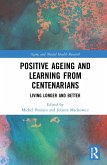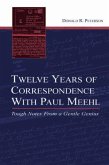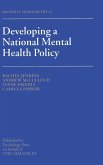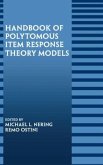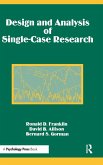Clinical Research in Psychoanalysis
Theoretical Basis and Experiences through Working Parties
Herausgeber: Altmann De Litvan, Marina
Clinical Research in Psychoanalysis
Theoretical Basis and Experiences through Working Parties
Herausgeber: Altmann De Litvan, Marina
- Gebundenes Buch
- Merkliste
- Auf die Merkliste
- Bewerten Bewerten
- Teilen
- Produkt teilen
- Produkterinnerung
- Produkterinnerung
This book looks at the place of clinical research in psychoanalysis, drawing on the work of a number of IPA working parties from a range of different schools of psychoanalytic thought.
Andere Kunden interessierten sich auch für
![Myers-Briggs Typology vs. Jungian Individuation Myers-Briggs Typology vs. Jungian Individuation]() Steve MyersMyers-Briggs Typology vs. Jungian Individuation186,99 €
Steve MyersMyers-Briggs Typology vs. Jungian Individuation186,99 €![Positive Ageing and Learning from Centenarians Positive Ageing and Learning from Centenarians]() Positive Ageing and Learning from Centenarians187,99 €
Positive Ageing and Learning from Centenarians187,99 €![Twelve Years of Correspondence with Paul Meehl Twelve Years of Correspondence with Paul Meehl]() Donald R PetersonTwelve Years of Correspondence with Paul Meehl188,99 €
Donald R PetersonTwelve Years of Correspondence with Paul Meehl188,99 €![Developing a National Mental Health Policy Developing a National Mental Health Policy]() Lynne FriedliDeveloping a National Mental Health Policy55,99 €
Lynne FriedliDeveloping a National Mental Health Policy55,99 €![Handbook of Polytomous Item Response Theory Models Handbook of Polytomous Item Response Theory Models]() Handbook of Polytomous Item Response Theory Models107,99 €
Handbook of Polytomous Item Response Theory Models107,99 €![Design and Analysis of Single-Case Research Design and Analysis of Single-Case Research]() Design and Analysis of Single-Case Research197,99 €
Design and Analysis of Single-Case Research197,99 €![Assessing Common Mental Health and Addiction Issues with Free-Access Instruments Assessing Common Mental Health and Addiction Issues with Free-Access Instruments]() Katie M SandbergAssessing Common Mental Health and Addiction Issues with Free-Access Instruments163,99 €
Katie M SandbergAssessing Common Mental Health and Addiction Issues with Free-Access Instruments163,99 €-
-
-
This book looks at the place of clinical research in psychoanalysis, drawing on the work of a number of IPA working parties from a range of different schools of psychoanalytic thought.
Hinweis: Dieser Artikel kann nur an eine deutsche Lieferadresse ausgeliefert werden.
Hinweis: Dieser Artikel kann nur an eine deutsche Lieferadresse ausgeliefert werden.
Produktdetails
- Produktdetails
- Verlag: Taylor & Francis Ltd (Sales)
- Seitenzahl: 342
- Erscheinungstermin: 20. Juli 2021
- Englisch
- Abmessung: 234mm x 156mm x 22mm
- Gewicht: 708g
- ISBN-13: 9781032023175
- ISBN-10: 1032023171
- Artikelnr.: 69984484
- Herstellerkennzeichnung
- Libri GmbH
- Europaallee 1
- 36244 Bad Hersfeld
- gpsr@libri.de
- Verlag: Taylor & Francis Ltd (Sales)
- Seitenzahl: 342
- Erscheinungstermin: 20. Juli 2021
- Englisch
- Abmessung: 234mm x 156mm x 22mm
- Gewicht: 708g
- ISBN-13: 9781032023175
- ISBN-10: 1032023171
- Artikelnr.: 69984484
- Herstellerkennzeichnung
- Libri GmbH
- Europaallee 1
- 36244 Bad Hersfeld
- gpsr@libri.de
Marina Altmann de Litvan, PhD, is a child and adolescent psychoanalyst (IPA) and a training and supervising analyst of the Uruguayan Psychoanalytical Association. Chair of the Clinical Research Subcommittee and Former Chair of the Clinical Observation Committee of the IPA (2010-2017). Ste received the Mary Sigourney Award 2017.
1. The Mysterious Leap from Clinical Practice to Clinical Research Liana Pinto Chaves 2. What Is Clinical Research in Psychoanalysis? Some Comments on Its Scientific Background Anna Ursula Dreher 3. Commentary Judy Kantrowitz 4. Researching Subjectivity: Single-Case Studies and Psychoanalytic Knowledge Robert Douglas Hinshelwood 5. Discussion Charles Hanly 6. Moving from Clinical Inquiry to Clinical Research Ricardo Bernardi 7. Improving the Interface: Comments on Bernardi: Moving from Clinical Inquiry to Clinical Research Horst Kächele 8. What is `Clinical Research
? Historical, Epistemological, and Methodological Remarks on the Relevance of Clinical Research in Times of Theoretical and Scientific Pluralism Marianne Leuzinger-Bohleber 9. Discussion by Bradley Peterson: Scientific Investigation in Psychoanalysis Bradley S. Peterson 10. Clinical Research: The Role of Metaphors in the Analytic Process Ana-María Rizzuto 11. Metaphors for the Patient
s Self as a Multiple Bridge for Clinical Research Beatriz de León de Bernardi Part IV Working Parties as Research Tools? 12. Working Parties as Clinical Research William Glover and Bernard Reith 13. Opening Psychoanalytic Space in First Interviews: An Overview of the Aims and Findings of the EPF Working Party on Initiating Psychoanalysis Bernard Reith 14. Is the Three-Level Model a Clinical Research Tool? Marina Altmann de Litvan, Ricardo Bernardi, and Margaret Ann Fitzpatrick-Hanly 15. The Working Party on Comparative Clinical Methods (CCM) and the Investigation in Psychoanalysis José Carlos Calich 16. Clinical Groups on the Specificity of Psychoanalysis Today. A New Research Method for Clinical Understanding Ana María Chabalgoity, César Luís de Souza Brito, and Ema Ponce de León 17. Faimberg
s Method `Listening to listening
Haydée Faimberg 18. Developing the Capacity for Clinical Investigation: The Working Party `Microscopy of the Analytic Session
Roosevelt M.S. Cassorla, Ana Clara Duarte Gavião, and Cláudia Aparecida Carneiro 19. Zoe Luisa Pérez Suquilvide 20. Panel: How Are Metaphors Identified and Elaborated by the Different Working Parties? Elizabeth Lima da Rocha Barros 21. A Clinical Illustration on the Working Party on the Specificity of Psychoanalytic Treatment Today
Latin American Group César Luís de Souza Brito and Ana María Chabalgoity 22. Metaphor Transformations in the 3-LM: A Systematic Clinical Exercise with Zoe
s Case Andrea Rodríguez Quiroga de Pereira, Bruno Salesio, and Adela Leibovich de Duarte 23. A Descriptive Comparison of First Interviews Under the Light of 3-LM and Initiating Psychoanalysis Andrea Rodríguez Quiroga de Pereira 24. The Impact of Clinical Investigation on the Analyst Vera Regina Fonseca 25. The Analyst
s Perspective: Commonalities and Differences of Working Parties on a Clinical Material Luisa Pérez Suquilvide 26. Clinical Psychoanalytic Research with the Working Party Method: State of the Art Rudi Vermote 27. Working Groups and the Search for Clinical Evidence
Ricardo Bernardi 28. Clinical Research in Working Parties Through Metaphors Marina Altmann de Litvan
? Historical, Epistemological, and Methodological Remarks on the Relevance of Clinical Research in Times of Theoretical and Scientific Pluralism Marianne Leuzinger-Bohleber 9. Discussion by Bradley Peterson: Scientific Investigation in Psychoanalysis Bradley S. Peterson 10. Clinical Research: The Role of Metaphors in the Analytic Process Ana-María Rizzuto 11. Metaphors for the Patient
s Self as a Multiple Bridge for Clinical Research Beatriz de León de Bernardi Part IV Working Parties as Research Tools? 12. Working Parties as Clinical Research William Glover and Bernard Reith 13. Opening Psychoanalytic Space in First Interviews: An Overview of the Aims and Findings of the EPF Working Party on Initiating Psychoanalysis Bernard Reith 14. Is the Three-Level Model a Clinical Research Tool? Marina Altmann de Litvan, Ricardo Bernardi, and Margaret Ann Fitzpatrick-Hanly 15. The Working Party on Comparative Clinical Methods (CCM) and the Investigation in Psychoanalysis José Carlos Calich 16. Clinical Groups on the Specificity of Psychoanalysis Today. A New Research Method for Clinical Understanding Ana María Chabalgoity, César Luís de Souza Brito, and Ema Ponce de León 17. Faimberg
s Method `Listening to listening
Haydée Faimberg 18. Developing the Capacity for Clinical Investigation: The Working Party `Microscopy of the Analytic Session
Roosevelt M.S. Cassorla, Ana Clara Duarte Gavião, and Cláudia Aparecida Carneiro 19. Zoe Luisa Pérez Suquilvide 20. Panel: How Are Metaphors Identified and Elaborated by the Different Working Parties? Elizabeth Lima da Rocha Barros 21. A Clinical Illustration on the Working Party on the Specificity of Psychoanalytic Treatment Today
Latin American Group César Luís de Souza Brito and Ana María Chabalgoity 22. Metaphor Transformations in the 3-LM: A Systematic Clinical Exercise with Zoe
s Case Andrea Rodríguez Quiroga de Pereira, Bruno Salesio, and Adela Leibovich de Duarte 23. A Descriptive Comparison of First Interviews Under the Light of 3-LM and Initiating Psychoanalysis Andrea Rodríguez Quiroga de Pereira 24. The Impact of Clinical Investigation on the Analyst Vera Regina Fonseca 25. The Analyst
s Perspective: Commonalities and Differences of Working Parties on a Clinical Material Luisa Pérez Suquilvide 26. Clinical Psychoanalytic Research with the Working Party Method: State of the Art Rudi Vermote 27. Working Groups and the Search for Clinical Evidence
Ricardo Bernardi 28. Clinical Research in Working Parties Through Metaphors Marina Altmann de Litvan
1. The Mysterious Leap from Clinical Practice to Clinical Research Liana Pinto Chaves 2. What Is Clinical Research in Psychoanalysis? Some Comments on Its Scientific Background Anna Ursula Dreher 3. Commentary Judy Kantrowitz 4. Researching Subjectivity: Single-Case Studies and Psychoanalytic Knowledge Robert Douglas Hinshelwood 5. Discussion Charles Hanly 6. Moving from Clinical Inquiry to Clinical Research Ricardo Bernardi 7. Improving the Interface: Comments on Bernardi: Moving from Clinical Inquiry to Clinical Research Horst Kächele 8. What is `Clinical Research
? Historical, Epistemological, and Methodological Remarks on the Relevance of Clinical Research in Times of Theoretical and Scientific Pluralism Marianne Leuzinger-Bohleber 9. Discussion by Bradley Peterson: Scientific Investigation in Psychoanalysis Bradley S. Peterson 10. Clinical Research: The Role of Metaphors in the Analytic Process Ana-María Rizzuto 11. Metaphors for the Patient
s Self as a Multiple Bridge for Clinical Research Beatriz de León de Bernardi Part IV Working Parties as Research Tools? 12. Working Parties as Clinical Research William Glover and Bernard Reith 13. Opening Psychoanalytic Space in First Interviews: An Overview of the Aims and Findings of the EPF Working Party on Initiating Psychoanalysis Bernard Reith 14. Is the Three-Level Model a Clinical Research Tool? Marina Altmann de Litvan, Ricardo Bernardi, and Margaret Ann Fitzpatrick-Hanly 15. The Working Party on Comparative Clinical Methods (CCM) and the Investigation in Psychoanalysis José Carlos Calich 16. Clinical Groups on the Specificity of Psychoanalysis Today. A New Research Method for Clinical Understanding Ana María Chabalgoity, César Luís de Souza Brito, and Ema Ponce de León 17. Faimberg
s Method `Listening to listening
Haydée Faimberg 18. Developing the Capacity for Clinical Investigation: The Working Party `Microscopy of the Analytic Session
Roosevelt M.S. Cassorla, Ana Clara Duarte Gavião, and Cláudia Aparecida Carneiro 19. Zoe Luisa Pérez Suquilvide 20. Panel: How Are Metaphors Identified and Elaborated by the Different Working Parties? Elizabeth Lima da Rocha Barros 21. A Clinical Illustration on the Working Party on the Specificity of Psychoanalytic Treatment Today
Latin American Group César Luís de Souza Brito and Ana María Chabalgoity 22. Metaphor Transformations in the 3-LM: A Systematic Clinical Exercise with Zoe
s Case Andrea Rodríguez Quiroga de Pereira, Bruno Salesio, and Adela Leibovich de Duarte 23. A Descriptive Comparison of First Interviews Under the Light of 3-LM and Initiating Psychoanalysis Andrea Rodríguez Quiroga de Pereira 24. The Impact of Clinical Investigation on the Analyst Vera Regina Fonseca 25. The Analyst
s Perspective: Commonalities and Differences of Working Parties on a Clinical Material Luisa Pérez Suquilvide 26. Clinical Psychoanalytic Research with the Working Party Method: State of the Art Rudi Vermote 27. Working Groups and the Search for Clinical Evidence
Ricardo Bernardi 28. Clinical Research in Working Parties Through Metaphors Marina Altmann de Litvan
? Historical, Epistemological, and Methodological Remarks on the Relevance of Clinical Research in Times of Theoretical and Scientific Pluralism Marianne Leuzinger-Bohleber 9. Discussion by Bradley Peterson: Scientific Investigation in Psychoanalysis Bradley S. Peterson 10. Clinical Research: The Role of Metaphors in the Analytic Process Ana-María Rizzuto 11. Metaphors for the Patient
s Self as a Multiple Bridge for Clinical Research Beatriz de León de Bernardi Part IV Working Parties as Research Tools? 12. Working Parties as Clinical Research William Glover and Bernard Reith 13. Opening Psychoanalytic Space in First Interviews: An Overview of the Aims and Findings of the EPF Working Party on Initiating Psychoanalysis Bernard Reith 14. Is the Three-Level Model a Clinical Research Tool? Marina Altmann de Litvan, Ricardo Bernardi, and Margaret Ann Fitzpatrick-Hanly 15. The Working Party on Comparative Clinical Methods (CCM) and the Investigation in Psychoanalysis José Carlos Calich 16. Clinical Groups on the Specificity of Psychoanalysis Today. A New Research Method for Clinical Understanding Ana María Chabalgoity, César Luís de Souza Brito, and Ema Ponce de León 17. Faimberg
s Method `Listening to listening
Haydée Faimberg 18. Developing the Capacity for Clinical Investigation: The Working Party `Microscopy of the Analytic Session
Roosevelt M.S. Cassorla, Ana Clara Duarte Gavião, and Cláudia Aparecida Carneiro 19. Zoe Luisa Pérez Suquilvide 20. Panel: How Are Metaphors Identified and Elaborated by the Different Working Parties? Elizabeth Lima da Rocha Barros 21. A Clinical Illustration on the Working Party on the Specificity of Psychoanalytic Treatment Today
Latin American Group César Luís de Souza Brito and Ana María Chabalgoity 22. Metaphor Transformations in the 3-LM: A Systematic Clinical Exercise with Zoe
s Case Andrea Rodríguez Quiroga de Pereira, Bruno Salesio, and Adela Leibovich de Duarte 23. A Descriptive Comparison of First Interviews Under the Light of 3-LM and Initiating Psychoanalysis Andrea Rodríguez Quiroga de Pereira 24. The Impact of Clinical Investigation on the Analyst Vera Regina Fonseca 25. The Analyst
s Perspective: Commonalities and Differences of Working Parties on a Clinical Material Luisa Pérez Suquilvide 26. Clinical Psychoanalytic Research with the Working Party Method: State of the Art Rudi Vermote 27. Working Groups and the Search for Clinical Evidence
Ricardo Bernardi 28. Clinical Research in Working Parties Through Metaphors Marina Altmann de Litvan



